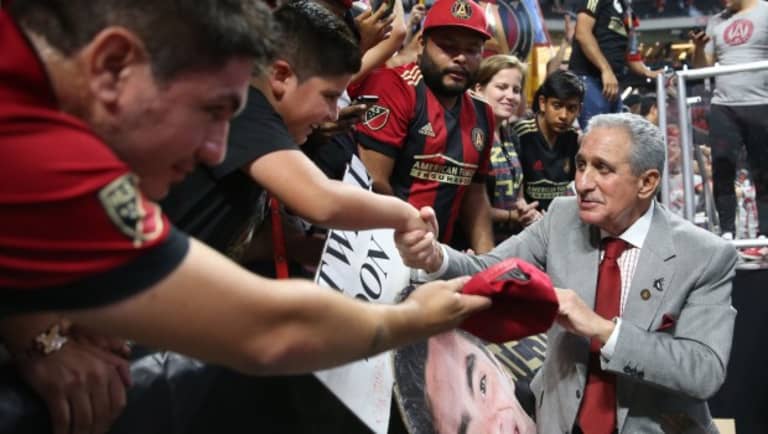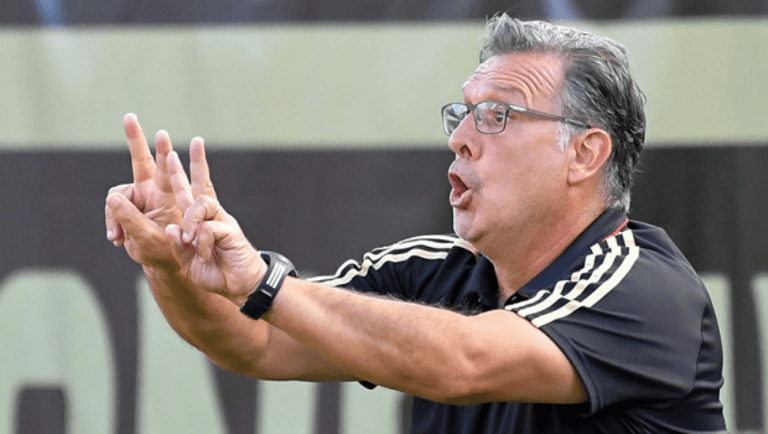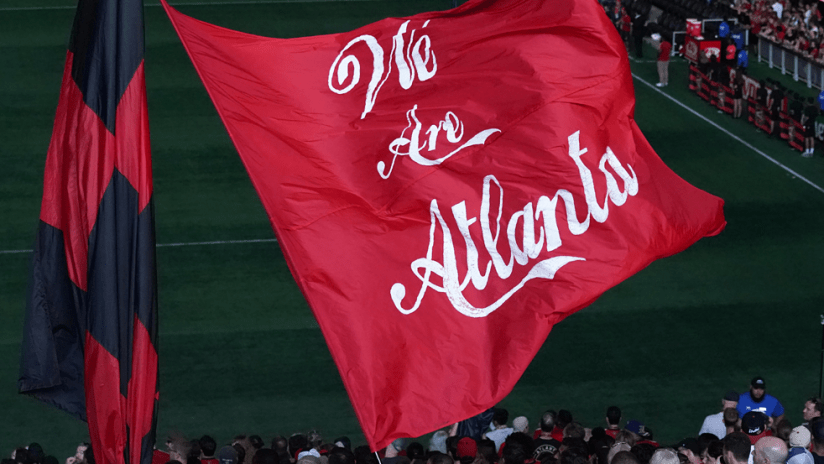As the MLS world descends upon Atlanta for the 2018 MLS All-Star Game presented by Target, we’re taking a look at what’s made the city’s team one of the most surprising and momentous success stories in league history. President Darren Eales has been with Atlanta United from the club’s inception and helped elaborate on the reasons for the remarkable rise of ATLUTD.
1. A team of their own
It’s a platitude that Atlanta is a city of transplants. In relation to the city’s major sports teams, it’s commonly been seen as a negative. Listless crowds have been considered a result of a city that cares about every team except its own. Atlanta United took advantage of a unique opportunity to turn that into a positive.
“People who are here are proud of Atlanta,” Eales said. “They're proud to be here, but they of course carry the baggage of their previous city and their previous teams. If you're from Philadelphia, you're still cheering on the Eagles even though you're living in Atlanta, you have kids in Atlanta and you love living in Atlanta. I think what we were able to do is create that club that was built around Atlanta, built around what it means to live in Atlanta and that's become the one club that everyone is united behind.
“In retrospect that wasn't something we were expecting to happen, but it's one of the things I'm proud of. What I love is that we turned that narrative on its head. Now the story is about what a great story Atlanta is, because you just can't argue.”
2. Arthur Blank loves a start-up (and his family)

Atlanta United owner Arthur Blank greets fans. | USA Today Sports Images
Arthur Blank turned the Home Depot from a local start-up to a Fortune 500 company. The mentality inherent in turning a start-up into an international success permeated through the day-to-day operations of Atlanta United before the team even had a name. It helped that Blank had an interest in soccer that hit close to home.
“From a business perspective, he was very bullish on soccer in America even when people were skeptical about soccer in the South. There's an emotional angle, he met Angie, his wife, on the soccer pitch. Their kids were playing. A number of his kids play soccer so he's emotionally invested in soccer,” Eales said. “I think thirdly he's a start-up guy. He obviously created Home Depot from scratch. There's an element out of Atlanta United that he got a real buzz out of. You have all of those aspects from Home Depot and his experience that made him – as a leader with his vision and core values that he has across all his businesses – a joy to work for. That commitment to being a success was there right from day one.”
Beyond soccer, Blank carried with him the respect of the city, instantly providing the-then unnamed club a surge of validity. If "Uncle Arthur" was in, big things were coming.
“When you look at all the factors that have gone into the successful start that we've had in Major League Soccer it's impossible to extract out each of them, but first I would say our owner,” Eales said. “The credibility he brought by bringing this team, the credibility he had already brought to Atlanta. he understood that you never get a second chance to start a club. He was prepared to bring me in 2 1/2 years before we kicked a ball to help plan the whole strategy.”
3. Making moments multiply
Leandro Gonzalez Pirez tapped in the first goal scored at Mercedes-Benz Stadium. | USA Today Sports Images
A large part of the business strategy involved creating capital “M” moments. Touchstones that the community could instantly identify as crucial to the creation and authentication of a club and culture.
“It was about creating moments where our fans could feel a part of the club and could get together. It was about creating those moments of passion because we weren't going to have a game for nearly three years. That created that culture of this club being a part of Atlanta,” Eales said.
To make those moments matter, Atlanta’s soccer team had to begin integrating its place into the community. Initially, Eales acted as the face of the club. The archives of Atlanta United social media are littered with pictures of Eales in costumes, in sweaters and, most importantly, in crowds around Atlanta preaching the gospel of Atlanta United.
“[Being in the community] was fundamentally important to us as a brand-new club coming in because we couldn't expect buy in from the fans if we weren't giving back to the community,” he said.
The club found a way to connect with community, as well as create an on-field moment for its growing fan base through its youth academy. Not only did the academy – started before the first team in a first-of-its-kind move for MLS – demonstrate a commitment toward long-term success, but it allowed the area’s youth players, regardless of background, to become a part of the team. That community involvement meant that the first academy game drew over 2,000 fans. It also led to Atlanta United’s first Homegrown Player.
“Explaining about Andrew Carleton as our first Homegrown and unveiling him at The Varsity where we had the go-pro in Arthur's posh Mercedes van that picked him up and took him there, that gave people an insight in how we we're building the club and what was important about the academy – [and] that was important about a Homegrown Player,” Eales said.
“I still go back to that game where he came on against Houston at the match at Bobby Dodd [Stadium]. One of our loudest moments of that season was Andrew coming on the pitch. I think that storytelling was part of it. He came on that pitch and everyone knew what it was to be a homegrown player. We created stars rather than just figuring we had to go and have someone who was a Premier League player for 20 years and bring him in.”
4. El Tata

ATLUTD head coach Gerardo "Tata" Martino has played a crucial role in the club's rise. | USA Today Sports Images
It feels like the most obvious bullet on the list but it’s impossible to mention the success of Atlanta United without acknowledging the impact of Gerardo “Tata” Martino. It’s hard to imagine South American players like Miguel Almiron, Josef Martinez and Tito Villalba turning to stars or even coming to Atlanta without El Tata at the helm. Those stars, along with Martino’s high-energy, high-scoring system, have created a culture that expects style to go hand in hand with results.
“He's been one of the critical elements to what we've been able to build because ultimately with a soccer club it's about what happens on the pitch,” Eales said. “You want to play exciting attractive soccer and that goes to Tata who got the team to play the way he did from the first season and to continue that in the second season has clearly been a page a part of what we've been able to succeed."
5. Atlanta's reputation as a “Bad Sports Town”
Perhaps the most abstract reason of the bunch, and yet points 1 through 4 don’t happen without No. 5. For as long as anyone can remember – and even still – Atlanta has been known as a town that doesn’t care about its teams.
“Literally the only negative I got from people when I took the job was almost a warning that ‘The town is really good … but do you realize that Atlanta is not a very good sports city?” Eales said. “They lost the Thrashers. The NHL teams they've had have come and gone. You go to Braves games, Hawks, Falcons, whatever pro sport it is they're playing, teams like the Red Sox, the Green Bay Packers, the Chicago Bulls come and the stadium is going to be the opposition fans. It's just really a fickle sports town.”
People assumed that soccer would be the same. That narrative became a challenge. That narrative forced the team’s hand. That narrative meant that the product had to be superb, or else.
“I think it goes from me all the way down that we're ultra-competitive. It's ‘The Bad Sports Town’ and we wanted to prove that wrong. We heard you can't hire a foreign coach because they don't work in MLS. There are these lazy, lazy throwaway clichés that you actually have to look behind to see if there's merit to it. There was definitely an element to try and prove them wrong.”
In addition to pushing the team, it also pushed a city starved for championships -- Atlanta has but one in major league sports since 1966 -- that constantly heard from cities with stocked trophy cases how bad Atlanta was at caring.
“I think there was that element of people wanted it to be a success because they're proud of the city. They hated this narrative that soccer wouldn't work in the South. Or that Atlanta was a ‘bad sports city.’ And I think there was an element of pride their where they were hoping we were going to prove them wrong.”
So far? So good.












